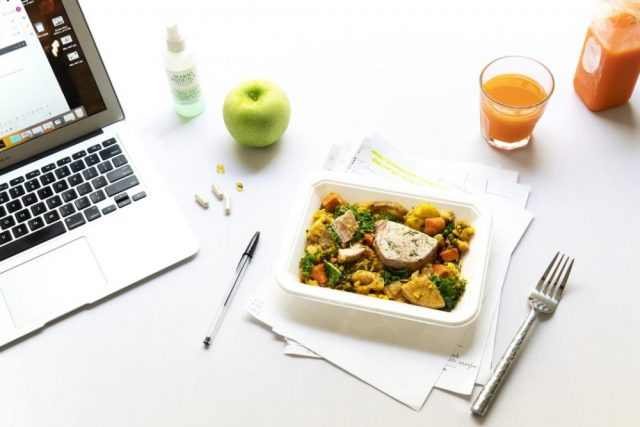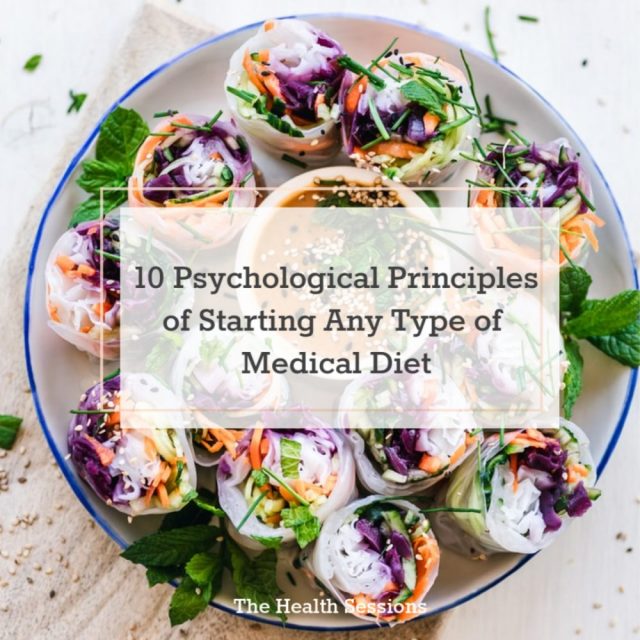4 Family Coping Skills After a Loved One’s Unexpected Diagnosis

Food is medicine.
More and more medical experts agree that what you eat has a significant impact on your health. After all, nutrients like protein, healthy fats, carbohydrates, vitamins and minerals are the building blocks or your body. And to function optimally, your body and brain require good fuel.
Unfortunately, Western diets high in refined sugars and trans fats cause insulin resistance and inflammation in the body, which contributes to diabetes, heart disease and cancer. And it’s not just your physical health that’s affected by what you eat – the budding field of nutritional psychiatry also links the foods you consume to how you feel and behave.
It’s no wonder that a growing body of doctors are prescribing healthy foods as part of their treatment plan. What’s more, lots of chronically ill people themselves turn to wholesome diets to alleviate or manage their symptoms.
But with an overwhelming amount of information out there, where do you begin?
Take a look at these 10 psychological principles for starting any kind of medical diet.
This blog post may contain affiliate links, at no extra cost to you. All opinions are my own.

No matter if you’re starting an autoimmune protocol, going gluten-free or you want to eat a plant-based diet, overhauling your diet requires a lot of commitment. When you want to follow a specific diet for medical reasons, here are 10 important principles to keep in mind:
Every food movement, from Paleo to vegan, claims to be the healthiest diet – with scientific evidence to back it up. But the latest research shows there is no such thing as a single diet that works for everyone. Even identical twins have different responses to the same foods. How you respond to nutrients like sugar and fat, not only depends on your gut microbiome, but also on the time of day and whether you’ve exercised beforehand.
Some medical diets are more clearly linked to positive health outcomes for certain diseases than others, like going gluten-free when you have Celiac’s disease. In general, beware of diets that make bold promises without sufficient proof.
And most of all, listen to your body. It gives you lots of subtle signals about what’s going on inside. If you really struggle to pinpoint which foods are good or bad for you personally, you could keep a food/symptom diary or follow an elimination diet under medical supervision.
Especially if you want to start a medical diet on your own, not by doctor’s orders, it’s vital to do your research. Get professional advice from a qualified expert on which healthy diet may be right for you. Don’t just copy what health bloggers or influencers on Instagram are eating – make sure you do what’s fitting for your situation. Turn to reliable sources for information.
Also, unless your treating physician advises you to do so, don’t cut out entire food groups and macronutrients, like carbs. You don’t want to do more harm than good and risk deficiencies. That’s why it’s important to research which vitamins and minerals you risk lacking with your new diet. For example, you should know how to get enough plant-based protein, iron and vitamin B12 before going vegan. And when you follow a ketogenic diet, you should monitor your intake of micronutrients.
To successfully stick to your medical diet, it helps to truly understand what you can and cannot eat, and why. Your doctor or diet book probably mentioned you cannot eat bread and pasta on a gluten-free diet, but it’s easy to overlook hidden sources of gluten like beer and nuggets.
So don’t just memorize a list of foods you may or may not consume, but learn more about harmful and healthy ingredients. It may take a little studying, but it will make eating out and adapting your go-to recipes much easier.
What’s more, get in the habit of reading labels. Of course, the best thing to do is eat as much unprocessed foods as possible, but that may not always be realistic.
And finally, don’t just focus on what you can’t eat, but also on the delicious things you can still have. Which brings me to my next point…

Let’s say you can’t have dairy on your medical diet, what can you eat instead? Having milk alternatives to turn to when you’re craving cappuccino will make it much easier to stick to your dietary plans in the long run. The same principle goes for mealtimes. If you build a recipe repertoire for various occasions, you’ll be less tempted to slip up and grab a slice of pizza.
Luckily, there are delicious cookbooks out there for every kind of diet. ‘The Green Kitchen’ is packed with vibrant vegetarian dishes, while ‘Food: What the Heck Should I Cook?’ shows you how to make tasty meals following the Pegan Diet. If you’re looking to expand your culinary collection with health-boosting recipes, check out 7 Cookbooks to Kickstart Your Healthy Lifestyle.
When you’ve decided which medical diet you’ll start and collected healthy recipes, it’s time to do some grocery shopping.
First, take inventory of your fridge and cupboard. Get rid of the foods you cannot eat. Or, if you have housemates, put them on a different shelve so you don’t accidentally grab some ‘forbidden’ foods out of habit.
Next, make a list of pantry staples you will need. Depending on your specific diet, you may stock your kitchen with herbal teas, healing spices, coconut oil, apple cider vinegar and gluten-free flower. And don’t forget (organic) fruit, vegetables and high-quality (plant-based) proteins. A little planning and preparation will go a long way when it comes to ingraining new eating habits into your life.
Maybe you’re the all-or-nothing type, in which case, the following advice may not be for you. But for most people, making drastic changes isn’t the recipe for long-term success. It requires a lot of willpower to stick to your medical diet when you have to think about each bite, because your eating behavior isn’t automated yet.
That’s why I’d recommend you start small, with one habit or one meal. You could begin by gradually reducing your sugar intake or cutting back on caffeine before doing the full autoimmune protocol. Or you can make over your breakfast, followed by drinks and snacks, then dinner and lunch until you’ve reached a healthy food pattern.
In the end, small changes add up to big changes.

We’ve all been there: at the end of a long day, you just can’t summon the energy to cook a healthy dinner. What can you do to not fall back into your old patterns when that happens?
One helpful strategy is to have healthy snacks and meals ready for moments when you’re tired or on-the-go. Put a fruit bowl on the counter and carry healthy trail mix for when the afternoon slump hits.Once in a while, cook double batches of soup, stews or pasta sauces and put one meal’s worth of food in the freezer. It’ll come in handy on busy days. You could also master a few effortlessly cooking techniques, like sheet pan dinners or one-pot meals.
By preparing yourself for the inevitable tough moments, you’ll be less like to have ‘cheat days’.
As we just described, there will come a time when you’re fed up with your medical diet. But quitting would be a waste of all your hard work – if you even have a choice to quit at all.
During those moments, remember why you started. Don’t just think about all the (horrible) things you hope to prevent, but also about what you might gain. The right diet for you could help you have more energy, less pain, a clear skin or improved thinking. Maybe you’ll even feel good enough to take up your hobby again, go on a trip or do something else you’d love to be able to do again.
Thoughts are powerful, so use and phrase them positively.
One element of healthy eating is having a healthy relationship with food. And although mindlessly overeating obviously isn’t good for your health, becoming obsessed with the numbers on your scale, FitBut or MyFitnessPal is not helpful either.
Your mood and self-worth shouldn’t depend on whether you hit certain targets or not. So – unless medically necessary – don’t count calories or calculate your ideal macronutrient ratio.
Instead, focus on making meals you enjoy from unprocessed, nutrient-rich ingredients. Sit down to savor each bite. Eating with attention actually aids your digestion and effortlessly helps you consume less calories than mindless eating. What’s more, learn to recognize your natural hunger and fullness signals, and how you can sense the difference between physical hunger and emotional cravings. No matter which medical diet you start, these strategies will help you eat more healthily than obsessing over numbers.

As important as good nutrition is for your health, it’s only one piece of the puzzle. Your genes, physical and social environment also play a part, things you don’t have much influence over. That’s why it you shouldn’t be too hard on yourself if your medical diet isn’t (immediately) getting you the result you’re hoping for.
But lifestyle factors like moving your body and stress management also important contributors to health and illness. If you want to cover all aspects of a healthy lifestyle, take a look at ‘How to Create Your Own Action Plan for Recovery’ to rebuild your health after illness or injury.
Which step will you take next to improve your diet and your health?
If you enjoyed reading this article, you might also like: